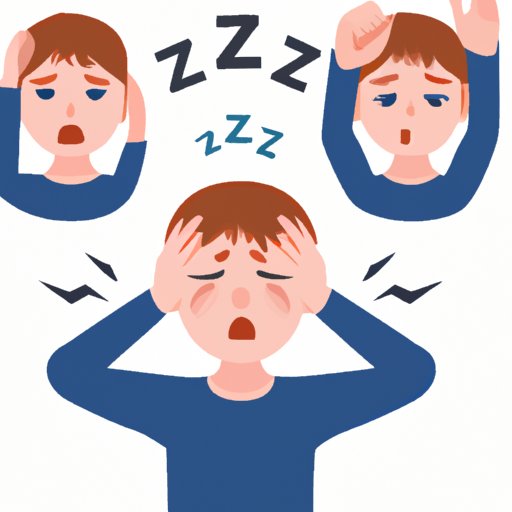
I. Introduction
Panic attacks are defined as a sudden and intense feeling of fear or discomfort, usually lasting for a few minutes. While they are commonly associated with anxiety disorders and can occur at any time, even during sleep, most people do not associate panic attacks with their sleep patterns. However, panic attacks at night are a common occurrence for many individuals and can cause significant disruptions in their sleep and overall well-being.
It is essential to understand how panic attacks manifest during sleep and the importance of addressing them to improve the quality of life and prevent the development of further mental health complications.
II. Identifying Panic Attacks at Night
Recognizing the symptoms of nocturnal panic attacks can be challenging, as the person may not remember what happened during their sleep. However, some of the common signs of nocturnal panic attacks include:
- Rapid heartbeat
- Tightness in the chest or throat
- Sweating or chills
- Trembling or shaking
- Shortness of breath or hyperventilation
- Feeling of impending doom or loss of control
It is important to note that nocturnal panic attacks are different from night terrors. Night terrors, or sleep terrors, are a type of parasomnia where the person abruptly awakens from sleep, often with a loud scream, and is visibly shaken or disoriented. Night terrors usually occur during non-REM (rapid eye movement) sleep, while panic attacks can happen during any stage of sleep.
III. Understanding the Causes of Panic Attacks at Night
There are many potential physical and psychological causes of nocturnal panic attacks, including:
Physical Causes
1. Sleep Apnea: Sleep apnea is a common sleep disorder characterized by pauses in breathing or shallow breathing during sleep, leading to disruptions in the sleep cycle and decreased airflow to the brain, which can result in panic attacks.
2. Gastroesophageal Reflux Disease (GERD): GERD is a digestive disorder caused by a weakened valve between the esophagus and stomach, leading to acid reflux during sleep, which can cause panic attacks.
Psychological Causes
1. Anxiety Disorders: Panic attacks are often associated with anxiety disorders, such as generalized anxiety disorder, panic disorder, and post-traumatic stress disorder.
2. Depression: Depression can affect a person’s mood and behavior, leading to anxiety and panic attacks.
IV. Managing Panic Attacks at Night
There are several strategies for managing panic attacks at night, including:
Breathing exercises
Deep breathing exercises, such as diaphragmatic breathing, can reduce the intensity and duration of panic attacks. Breathe in slowly through your nose, counting to four, and then breathe out slowly through your mouth, counting to six. Repeat this exercise for a few minutes until you feel calmer.
Visualizations
Visualizations, such as picturing a peaceful place or imagining yourself in a calming situation, can help ease anxiety and prevent panic attacks.
Muscle relaxation techniques
Muscle relaxation techniques, such as progressive muscle relaxation, can help reduce muscle tension and anxiety. These exercises involve tensing and relaxing different muscle groups in your body, one at a time.
Mindfulness meditation
Mindfulness meditation can help calm the mind and promote relaxation. Sit or lie comfortably in a quiet place, focus on your breathing, and try to let go of any thoughts or feelings that may arise.
Seeking professional help
If you are experiencing frequent or severe panic attacks at night, it is important to seek professional help from a mental health provider. Counseling and therapy can help you develop coping skills and strategies to manage your anxiety and panic attacks.
Medication
Medication, such as antidepressants or anti-anxiety medication, may be prescribed to help manage symptoms of panic attacks. It is essential to consult with a healthcare provider before starting any medication.
V. Preventing Panic Attacks at Night
Preventing panic attacks at night is crucial to improving the quality of your sleep and overall well-being. Some strategies that may help include:
Establishing a regular sleep schedule
Going to bed and waking up at the same time every day can help regulate your sleep cycle and reduce the likelihood of panic attacks at night.
Avoiding triggers
Identifying and avoiding triggers, such as caffeine, alcohol, or stressful situations, can help prevent panic attacks.
Keeping a sleep diary
Keeping a record of your sleep patterns and any triggers or symptoms can help identify patterns and potential causes of panic attacks at night.
Limiting caffeine and alcohol intake
Caffeine and alcohol can disrupt your sleep patterns and increase the likelihood of panic attacks. It is important to limit your intake of these substances, especially in the hours leading up to bedtime.
VI. Conclusion
Nocturnal panic attacks are a relatively common occurrence that can have a significant impact on a person’s quality of life. Identifying the symptoms and causes of panic attacks at night, as well as implementing strategies to manage and prevent them, can help improve sleep hygiene and overall well-being. Seeking professional help and treatment can also be beneficial in managing panic attacks. It is essential to prioritize good sleep hygiene and address any mental health concerns to maintain optimal health and wellness.





